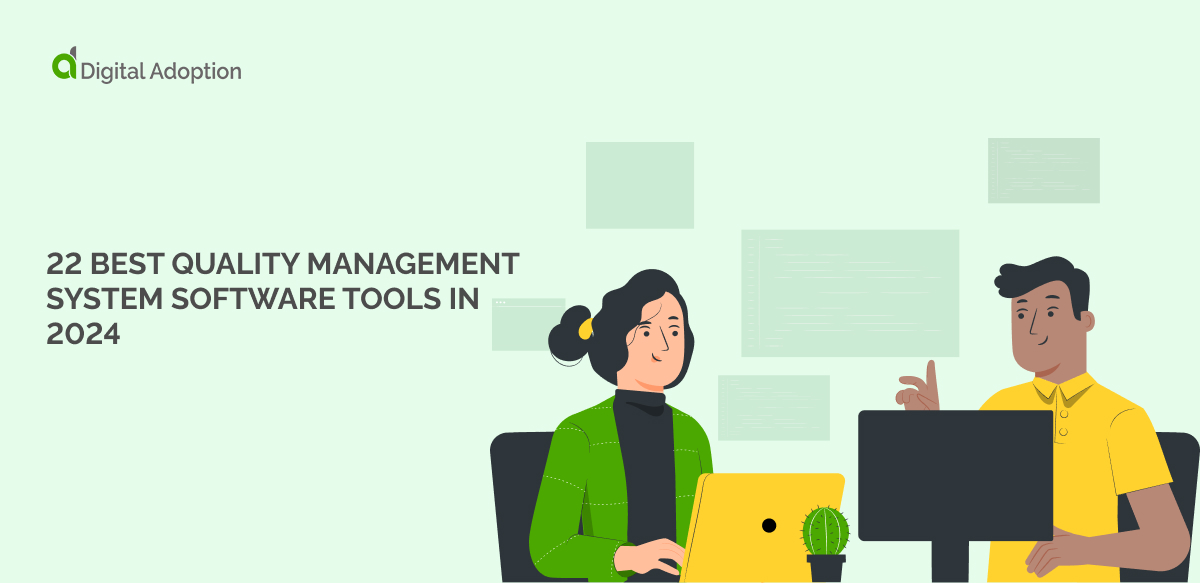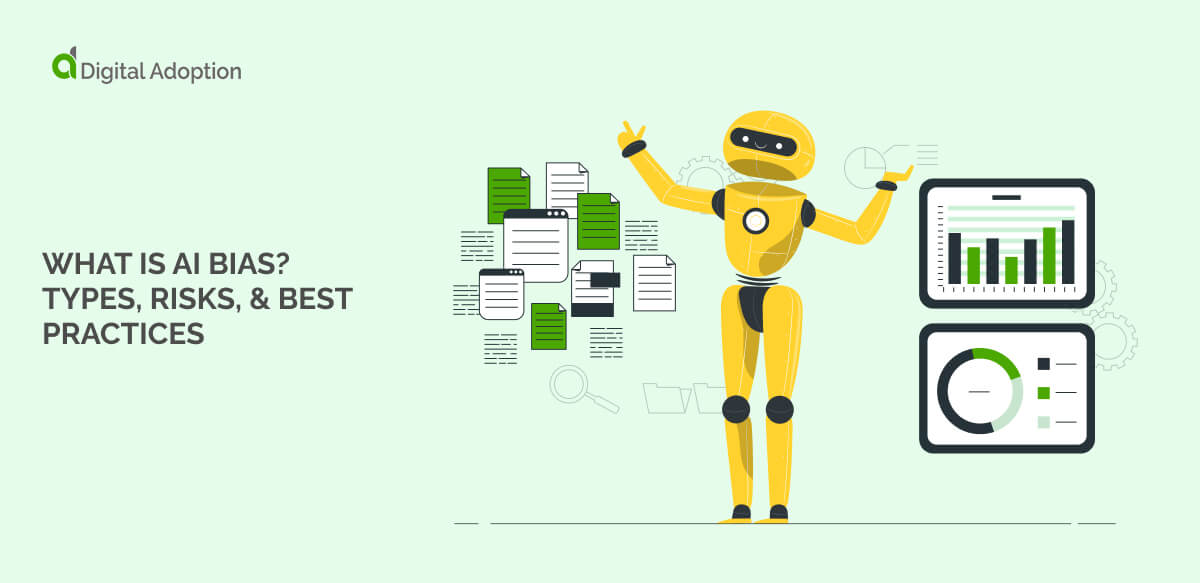Quality management software systems (QMS) go beyond easing tasks for quality teams. In competitive and regulated industries such as pharmaceuticals, life sciences, and manufacturing, the right QMS can determine success or failure.
Investing in quality management software supports innovation in various industries. It does this by facilitating the development of safe, compliant products that exceed customer engagement.
Selecting the ideal quality management software involves careful evaluation of features. You should also consider user experience, training, and scalability to accommodate business growth.
To assist in your search, here’s a curated list of the 22 top-quality management software systems available to companies in 2024. We will also go through what QMS software is and its benefits and challenges. Next, we will help you find the best tool for your needs.
- What is quality management system software?
- 22 best quality management system software tools in 2024
- How to select the right quality management system software tool
- What are the benefits of quality management system software tools
- What are the challenges of quality management system software tools?
- Drive the implementation of a quality management system tool with a digital adoption platform
What is quality management system software?
Quality management system (QMS) software helps organizations manage the quality of their products and services. It is a framework that documents a business’s rules and standards to achieve quality policies and objectives.
QMS software helps companies meet regulatory requirements, exceed customer expectations, and improve operational efficiency.
This software includes document control, audit management, non-conformance tracking, corrective and preventive actions (CAPA), and employee training. These features ensure a comprehensive approach to quality management.
Moreover, QMS software supports continuous improvement. It provides tools to measure and analyze performance against established quality standards.
22 best quality management system software tools in 2024
Here’s our list of our top 22 quality management system software tools:
1. Greenlight Guru
- G2 rating: 4.5 (388)
- Pricing: Contact Greenlight Guru for their various pricing options.
Greenlight Guru is a cloud-based QMS solution designed for the medical device industry. It helps teams achieve compliance with global standards like FDA and ISO. It allows medical device companies to bring products to market while minimizing risk.
Features this tool offers:
- Helps companies modernize their quality systems and scale quality across their organization.
- Possesses signature design controls, risk management, and AI-powered risk intelligence to encourage medical device development.
- Aligns with FDA and ISO standards, allowing teams to focus on innovation and quality maintenance.
- Provides end-to-end traceability throughout the product lifecycle to automate processes.
- Offers document management, training management, audit management, and CAPA management.
- Provides a library of audit-tested QMS templates supported by decades of industry expertise.
2. ETQ Reliance
- G2 rating: 4.2 (482)
- Pricing: Contact ETQ Reliance for their pricing options.
ETQ provides quality management software solutions that help organizations better organize and automate their quality processes. ETQ’s platform offers a range of features to manage quality tasks, documents, methods, and data. This ensures compliance with regulatory standards and drives continuous improvement.
Features this tool offers:
- Facilitates audit planning, scheduling, execution, and reporting. It also tracks findings, observations, and corrective actions for compliance.
- Allows organizations to create, review, approve, distribute, and archive documents.
- Streamlines change control with workflows for initiating, reviewing, approving, and implementing changes.
- Supports corrective and preventive action by helping users identify and resolve quality issues.
- Tracks training records, schedules sessions, and manages materials and certifications.
- Enables organizations to capture, track, and manage non-conformances.
3. TrackWise
- G2 rating: 4.3 (43)
- Pricing: Contact TrackWise for its various pricing options.
TrackWise is a cloud-based QMS platform that uses a modular approach to help manufacturers integrate their quality processes into a single solution. Built on Salesforce, It integrates with Salesforce’s ecosystem.
Features this tool offers:
- Manage and control all quality-related documents.
- Collaborate with suppliers for onboarding, audits, and incident management.
- Track, assess, and resolve customer complaints.
- Identify, check, and mitigate quality risks within the organization.
- Streamline the process of identifying and rectifying non-conforming products or processes.
- Assess and categorize complaints to improve resolution.
- Maintain compliance with industry regulations through automated tracking.
- Improve supplier collaboration for smoother onboarding, regular audits, and efficient incident handling.
- Use AI for creating decision-making workflows.
- Leverage automatic recommendations and pattern recognition to improve quality control.
- Use AI to suggest relevant quality categories and risks based on incoming complaints.
- Reduce the time and effort spent on investigating incidents and events through AI.
4. Qualio
- G2 rating: 4.4 (349)
- Pricing: Contact Qualio for more information on its four pricing tiers.
Qualio is a cloud-based system that streamlines and automates quality processes. It offers a complete set of tools and features for managing quality assurance.
Features this tool offers:
- Features an intuitive interface designed to lower the learning curve.
- Enables teams to adopt and use its comprehensive suite of features.
- Manages and controls documents to maintain quality standards.
- Ensures that you train employees to be compliant with necessary regulations.
- Simplifies and streamlines the audit process to ensure readiness and compliance.
- Facilitates seamless collaboration among teams, regardless of their location.
- Maintains a unified approach to quality management across dispersed teams.
- Offers reporting and analytics tools that provide clear visibility into all quality processes.
- Enables organizations to make proactive improvements and informed decisions based on data insights.
5. Intellect
- G2 rating: 4.6 (92)
- Pricing: Contact Intellect for information about its pricing packages.
Intellect Quality Management System helps organizations streamline and automate quality management processes. It ensures that employees stay compliant with industry standards and regulations and allows integrations with Microsoft Office and Slack, among other things.
Features this tool offers:
- Offers document control, ensuring compliance and easy access to critical information.
- Simplifies planning and execution of audits through a comprehensive audit management functionality.
- Provides insights for continuous improvement and decision-making through analytical and reporting tools.
- Manages quality assurance and control activities through its user-friendly interface.
6. Arena
- G2 rating: 4.2 (363)
- Pricing: Contact Arena for information on its three pricing options.
Arena is a Quality Management System (QMS) platform. It works for teams developing products with distributed workforces and global supply chains. It can maintain regulatory compliance for complex electronics and medical devices.
Arena’s features support adherence to standards like FDA, ISO, ITAR, and EAR, ensuring products meet stringent regulatory requirements across various regions.
Features this tool offers:
- Offers capabilities tailored for medical device manufacturing processes. This includes management of standard operating procedures (SOPs) and device master records.
- Allows organizations to centralize documentation and workflows.
- Provides a software validation solution that integrates with QMS processes. This enables comprehensive documentation, impact analysis reports, and ongoing validation support.
7. Qualityze eQMS
- G2 rating: None
- Pricing: Contact Qualityze eQMS for its pricing information.
Qualityze helps organizations manage and improve their quality processes. It provides various features for industries like manufacturing, healthcare, and life sciences. Qualityze helps companies follow quality standards like ISO 9001 and FDA regulations.
Features this tool offers:
- Track training records, schedule sessions, and manage materials and certifications for competency compliance.
- Capture, track, and investigate non-conformances.
- Check and track supplier performance.
- Handle process, document, product, and system changes with workflows.
- Plan, schedule, and conduct audits; manage findings, corrective actions, and follow-ups.
8. Ideagen
- G2 rating: 4.0 (314)
- Pricing: Get in touch with Ideagen for its pricing options.
Ideagen quality management system specializes in governance, risk, and compliance solutions. It can help organizations streamline and optimize their quality management processes.
Features this tool offers:
- Offers a comprehensive solution for managing quality across business operations.
- Excels in robust document management, audit readiness, and risk management features.
- Simplifies complex processes through its intuitive interface.
- Is scalable, meaning it can cater to growing businesses and adapt to regulatory changes.
- Supports continuous improvement and informed decision-making through detailed analytics and insights.
9. SAP S/4HANA Cloud
- G2 rating: 4.5 (699)
- Pricing: Contact SAP S/4HANA Cloud for its various pricing tiers.
SAP Quality Management is a module in the SAP ERP system. It helps organizations manage and control quality processes and activities, ensuring products and services meet quality standards and follow industry regulations.
Features this tool offers:
- Offers a robust, integrated solution to enhance operational efficiency and product quality.
- Allows seamless integration with enterprise operations.
- Possesses advanced analytics and reporting capabilities that enable informed decision-making.
- Gives support for regulatory compliance that ensures products meet the highest standards.
- Has scalable architecture adapts to businesses of any size.
10. Ease
- G2 rating: 4.5 (153)
- Pricing: Contact Ease for its pricing information.
Ease is a digital platform that connects and automates important work processes within manufacturing. It focuses on quality management, safety, and operational efficiency. Ease offers real-time insights and visibility across sites to boost efficiency. It also helps prevent compliance issues, reduce defects, and lower costs.
Features this tool offers:
- Empowers frontline workers with centralized data and instant performance visibility to improve profitability.
- Detects non-conformances and ensures complete issue resolution.
- Allows customization of checklists, tracking of corrective actions, and unlimited audits.
- Helps meet safety regulations by identifying and mitigating hazards that could cause injuries.
- Provides real-time data and visibility for timely actions and company-wide best practice adoption.
- Enables efficient digital audits. This includes LPAs, safety inspections, Gemba walks, 5S evaluations, and ad hoc findings tracking.
11. SmartSolve (part of IQVIA)
- G2 rating: 4.4 (4)
- Pricing: Contact SmartSolve to find out about their pricing options.
SmartSolve is a comprehensive quality management system (QMS) software solution. It helps organizations manage their quality processes, ensures compliance with regulatory standards, and drives continuous improvement initiatives, making it suitable for various industries.
Features this tool offers:
- Enables organizations to capture, track, and manage non-conformances and quality incidents.
- Allows organizations to manage the creation of quality documents such as policies, procedures, and other records.
- Tracks training completion to ensure workforce readiness and compliance.
- Tracks CAPA tasks, assigns responsibilities and monitors the effectiveness of corrective actions.
- Initiates and tracks corrective actions to address identified issues and enhance compliance.
- Ensures compliance with both internal procedures and external regulations through audit management.
- Assists organizations in managing processes, documents, products, or systems changes.
- Supports audit planning, scheduling, execution, and reporting processes.
- Provides workflows for change initiation, review, approval, and implementation,
- Helps organizations manage employee training and competency assessments.
12. ZenQMS
- G2 rating: 4.7 (68)
- Pricing: ZenQMS has one annual pricing option for all users. Contact them for more information.
ZenQMS is a platform created by life sciences experts who understand manufacturing challenges. It helps manage compliance with GxP quality guidelines and ISO requirements. It serves small to large life sciences organizations and covers pre-clinical to commercial products, meeting all industry regulatory requirements.
Features this tool offers:
- Covers document management, change control, employee training, audits, and issue management.
- Helps organizations begin their ISO 9001 quality management journey.
- Handles complex projects involving external certification bodies.
- Manages documents with compliant electronic signatures, tracks staff training, assigns CAPAs and handles external services.
- Can customize processes with unique forms, stages, workflows, and dashboards
13. MasterControl
- G2 rating: 4.3 (323)
- Pricing: Contact MasterControl for more information about its yearly pricing option.
MasterControl assists in streamlining and automating quality processes in industries such as life sciences, manufacturing, and technology.
Their platform includes a range of tools to manage tasks, documents, processes, and data, which promotes continuous improvement.
Features this tool offers:
- Provides tools for planning, scheduling, conducting, and managing audits and inspections.
- Tracks training records, schedules sessions, and manages materials and certifications.
- Evaluate and monitor supplier performance and track supplier-related quality events and corrective actions.
- Captures, tracks, and manages non-conformances, deviations, complaints, CAPAs, and adverse events.
- Facilitates change management with workflows for initiating, reviewing, approving, and implementing changes.
14. Intelex
- G2 rating: 4.1 (22)
- Pricing: Contact Intelex for more information about pricing costs.
Intelex Technologies offers a software platform for environmental, health, safety, and quality (EHSQ) management. The platform helps organizations centralize data, automate tasks, and ensure compliance with regulations and industry standards.
Features this tool offers:
- Provides a comprehensive suite to enhance quality assurance across operations.
- Excels in managing documents and facilitating audits within a centralized system.
- Offers actionable insights through real-time reporting and analytics tools.
- Promotes engagement among team members through mobile accessibility and a user-friendly interface.
15. AssurX
- G2 rating: 4.6 (10)
- Pricing: Get in touch with AssurX for current pricing information.
AssurX is a comprehensive Quality Management System (QMS) software for regulated industries. It streamlines quality processes, ensures regulatory compliance, and drives continuous improvement. AssurX offers modules and functionalities to manage quality tasks, documents, processes, and data.
Features this tool offers:
- Ensures proper documentation and compliance with change control procedures.
- Allows organizations to create, review, approve, distribute, and archive documents. It ensures version control, access control, and compliance with regulatory requirements.
- Tracks employee training records, schedules training sessions, and manages training materials and certifications.
- Supports Corrective and Preventive Action (CAPA) processes. It helps users identify, document, investigate, and resolve quality issues. It also tracks corrective actions and preventive measures and monitors their effectiveness.
- Captures, tracks, and manages non-conformances, deviations, and quality incidents.
- Helps organizations plan, execute, and track audits and inspections.
16. QT9
- G2 rating: 4.8 (43)
- Pricing: QT9 offers a yearly pricing option with a free trial. Contact them for more information.
QT9 QMS helps businesses automate and streamline their quality management processes. The software enables users to trace quality issues back to their root cause. This facilitates effective problem-solving.
Features this tool offers:
- Leverages a comprehensive, user-friendly platform to simplify product quality and regulatory compliance.
- Automates important quality processes such as document control, audit management, and CAPA.
- Ensures accessibility across locations through the cloud, fostering team collaboration.
- Offers integration capabilities with ERP systems that streamline data flow and operational efficiency.
- Reduces training time and enhances user adoption through its interface.
- Has robust reporting tools provide actionable insights for continuous improvement and strategic decision-making.
17. Veeva Vault
- G2 rating: 3.9 (6)
- Pricing: Get in touch with Veeva Vault for its pricing options.
Veeva Vault QMS helps life science and pharmaceutical companies manage quality assurance, control, and compliance processes.
Features this tool offers:
- Provides tools to control and manage business processes.
- Manages documentation and Standard Operating Procedures (SOPs).
- Facilitates supplier management processes.
- Creates audit trails to track activities.
- Tracks and reports metrics such as quality events and deviations.
- Ensures compliance with industry regulations.
- Supports manufacturing high-quality products.
- Centralizes all processes, documents, and data for improved efficiency and visibility.
- Handles customer issues.
- Manages workforce compliance and enhances quality awareness.
18. Quartz
- G2 rating: None
- Pricing: Contact Quartz for its pricing information.
QuartzQMS is quality management software. It specializes in compliance and quality management solutions and aims to improve enterprise and product quality.
Features this tool offers:
- Offers a streamlined approach to managing quality processes within organizations.
- Enables easy access from anywhere through the cloud.
- Features a user-friendly interface that reduces the learning curve for new users.
- Emphasizes automation to reduce manual tasks, freeing up time for strategic quality initiatives.
19. QAD eQMS
- G2 rating: 3.6 (9)
- Pricing: Contact QAD for its pricing details.
QAD is well-known for its enterprise resource planning (ERP) software. It integrates QMS functionalities into its broader ERP solution, offering significant value in managing quality tasks and processes.
Features this tool offers:
- Oversees changes to processes, products, or systems through its change management function. It provides workflows for initiating, reviewing, approving, and implementing changes.
- Captures and manages non-conformances by identifying, documenting, and tracking quality incidents. It initiates and tracks corrective actions to prevent recurrence.
- Handles identifying, investigating, and resolving quality issues using its CAPA module. It documents corrective and preventive actions, tracks action items, and monitors effectiveness.
- Manages quality documents like SOPs, work instructions, and manuals. It includes version control, approval workflows, and central storage.
- Supports audit planning, execution, and reporting. It schedules audits, conducts inspections, records findings, and manages follow-up actions.
20. Qualcy
- G2 rating: 4.7 (3)
- Pricing: Get in touch with Qaulcy regarding pricing options.
Qualcy QMS is a specialized quality management system made for biomedical companies. It’s tailored for medical device manufacturers, pharmaceutical firms, and others in the biomedical industry.
The software includes documentation, calibration, and PM management. To meet industry needs, it also offers features for training record management, CAPA management, and audit management.
Features this tool offers:
- Simplifies document control with change management and virtual cabinets.
- Offers comprehensive tracking and approval features for calibration and preventive maintenance tasks.
- Enables assignment, tracking, and reporting of training requirements.
- Makes audit planning, execution, and reporting easier.
- Incorporates built-in security features, role-based access control, and error-proof mechanisms.
- Enhances visibility and efficiency using automated workflows with task and notification visibility.
21. ComplianceQuest
- G2 rating: 4.3 (67)
- Pricing: Get in touch with ComplianceQuest for its pricing options.
ComplianceQuest is a cloud-based Quality Management System (QMS) software. It helps organizations streamline quality processes, ensure regulatory compliance, and drive continuous improvement. The platform offers features to manage tasks, documents, processes, and data related to quality.
Features this tool offers:
- Manages changes to processes, documents, products, or systems with workflows.
- Handles the creation, management, and control of quality documents.
- Captures, tracks, and manages non-conformances and quality incidents.
- Manages employee training and competency assessments.
- Facilitates Corrective and Preventive Action (CAPA) processes.
- Supports audit planning, scheduling, execution, and reporting.
22. Windchill
- G2 rating: 4.0 (93)
- Pricing: Contact Windchill for its various pricing tiers.
Windchill, developed by PTC, is a Product Lifecycle Management (PLM) software suite. It manages product development and supports Quality Management System (QMS) tasks. Windchill helps organizations streamline quality processes, ensure regulatory compliance, and promote continuous improvement.
Features this tool offers:
- Captures, tracks, and manages non-conformances, deviations, and quality incidents.
- Plans, schedules, conducts and manages audits and inspections.
- Manages creating, reviewing, approving, and controlling quality documents like procedures and specifications.
- Evaluates supplier performance, manages relationships, and tracks supplier-related quality issues and corrective actions.
- Supports identifying, documenting, investigating, and resolving quality issues.
- Improves workflows when changing processes, documents, products, or systems.
How to select the right quality management system software tool
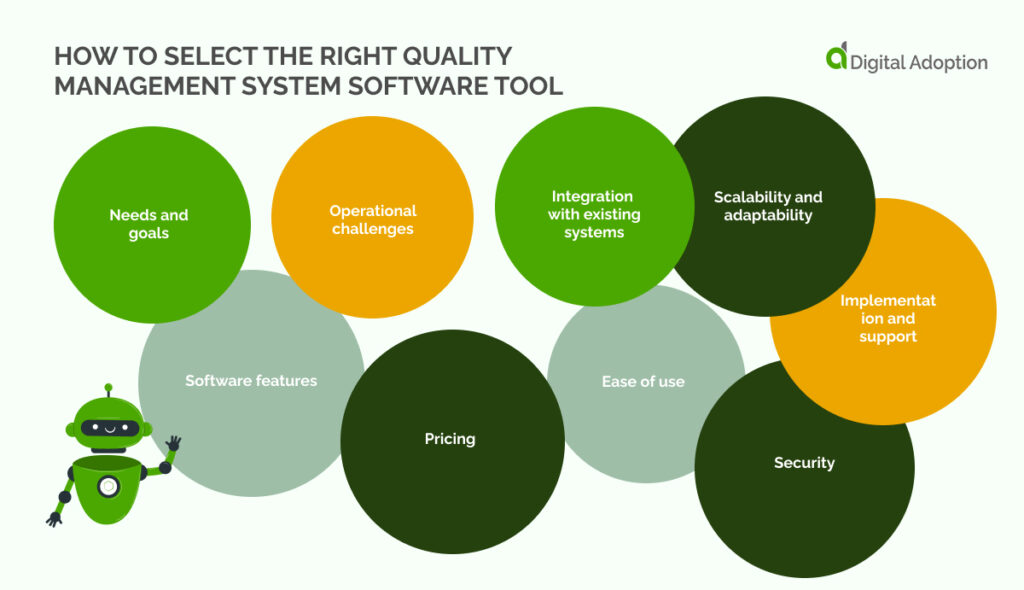
Here are some tips to help you make an informed decision when choosing a quality management system software tool:
Needs and goals
Start by determining your requirements and goals for choosing a QMS software. Identify specific quality-related challenges your business faces. Clarify your objectives for implementing a QMS. Determine if you need a system that handles many sites or languages. These questions help narrow down your options.
Operational challenges
Test operational challenges in your organization related to quality management. Identify issues like data accuracy, manual processes, lack of visibility, or inefficient communication. Pinpoint pain points and areas for improvement. This analysis helps identify specific eQMS processes or modules to address these challenges.
Software features
Once you understand your needs and goals, check the features of each QMS software. Common features include document control and audit management. It also offers nonconformance tracking and risk management. Look for software with the features you need to meet your goals.
Pricing
Consider how much you are willing to pay for your QMS. Titan’s pricing varies based on the number of employees. The normal contract period is one month, not yearly. Titan requires only one group license, usable by many people.
Integration with existing systems
Ensure the QMS integrates well with your existing systems, processes, and workflows. It should connect with your ERP, MES, PLM, and other software platforms. The QMS should adapt to your specific manufacturing methods, such as lean, agile, or Six Sigma. It should support your data collection, analysis, reporting, and visualization needs.
Ease of use
QMS software is effective only if employees use it. Look at the ease of use of each software you’re considering. Look for intuitive software with clear instructions and user-friendly interfaces.
Scalability and adaptability
As your business grows, you need a QMS that grows with you. The QMS should handle increasing volumes, complexity, and diversity of products and processes. It should accommodate new markets, customers, and regulations. Look for a QMS that offers continuous improvement and can scale up or down according to your changing needs.
Implementation and support
Consider the implementation process and ongoing support from the QMS vendor. Find a vendor that provides training and support to help you get up and running. Check their customer service hours and responsiveness. Also, look at any more fees for implementation or support.
Security
Ensure your QMS protects confidential and sensitive data. This can include customer information, product specifications, quality records, and audit reports. The QMS should follow relevant security standards and regulations, such as ISO 27001.
What are the benefits of quality management system software tools
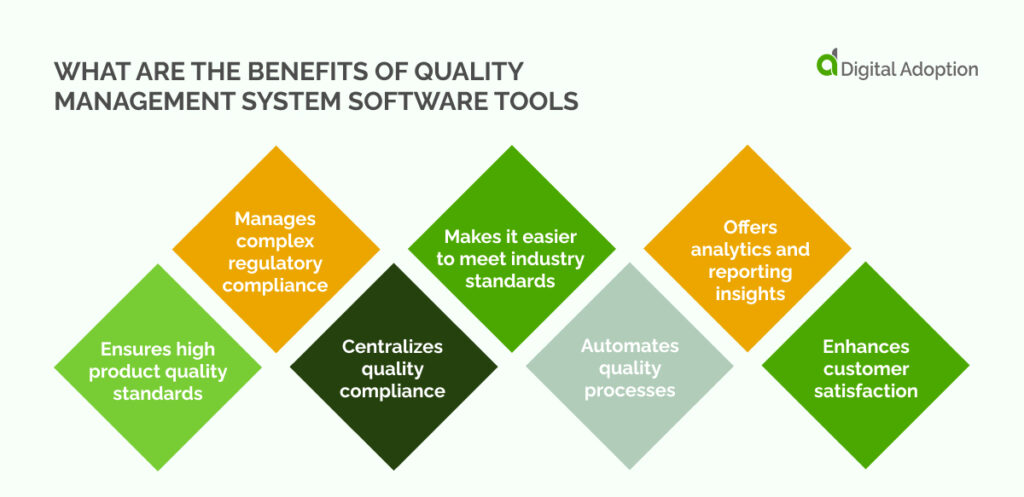
The advantages of quality management system software tools are:
Ensures high product quality standards
Quality management system software empowers organizations to track and improve product quality. It reduces the risk of failures and enhances customer satisfaction throughout the product lifecycle.
Manages complex regulatory compliance
Navigating regulatory standards across industries such as medical devices, food, cosmetics, and chemicals (including FDA, ISO 9001, and others) can be complex. Quality management systems simplify compliance management with robust monitoring and reporting capabilities.
Centralizes quality compliance
Industry-specific QMS solutions enable centralized management of quality control protocols, improvement plans, and compliance across many facilities. Real-time monitoring helps identify and prevent quality issues early, ensuring regular product quality and customer satisfaction.
Makes it easier to meet industry standards
QMS software helps organizations adhere to regulatory requirements, maintain standards essential for market credibility and legal compliance, and mitigate business risks associated with production errors and service defects.
Automates quality processes
Automation within QMS streamlines quality inspections, control checklists, reporting, and improvement plans. This improves efficiency and accuracy while ensuring compliance. Early detection of quality issues reduces rework and scrap rates, optimizing resources.
Offers analytics and reporting insights
Quality management system software provides valuable insights through analytics and reporting. This empowers informed decision-making and continuous improvement of quality management strategies.
Enhances customer satisfaction
QMS’s quality assurance modules enable thorough product reviews to identify and rectify defects before reaching consumers. This ensures higher customer satisfaction and loyalty.
What are the challenges of quality management system software tools?
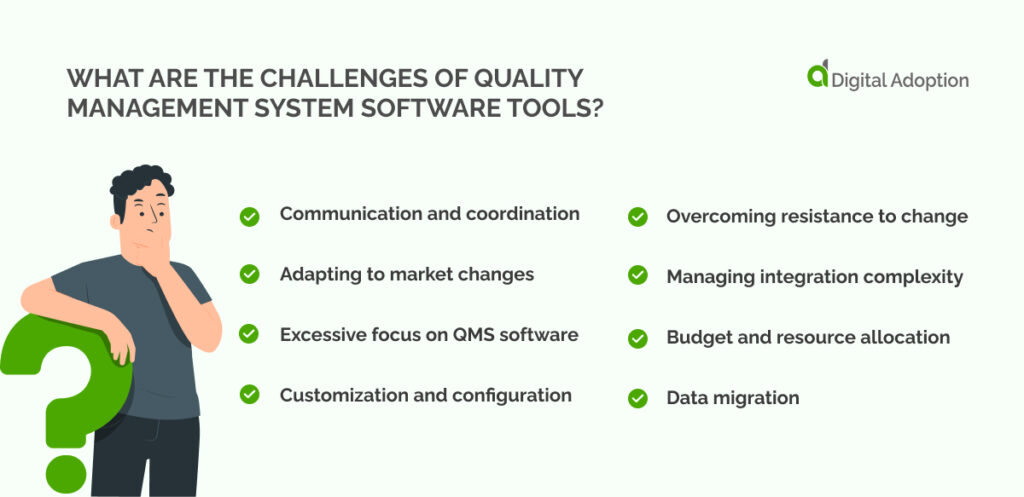
Here are the challenges of using quality management system software tools:
Communication and coordination
Implementing a QMS often presents communication and coordination issues. Teams and senior stakeholders must collaborate. They must also understand their roles at each stage while keeping everyone informed. Without effective communication, delays, mistakes, and misunderstandings can occur.
Adapting to market changes
In today’s fast-paced market, businesses must remain agile. Outgrowing your quality management system can be disastrous. Before launching new products, ensure your quality processes are adaptable and align with evolving needs. This ensures compliance, safety, and quality while maintaining competitiveness.
Excessive focus on QMS software
Quality management software excels at tracking compliance documentation. While the software offers various features, documentation remains its core capability. However, excessive focus on documentation can detract from practical measures to enhance product quality.
Customization and configuration
Customizing QMS software to meet unique business requirements is difficult. Misconfiguration can lead to problems with functionality and efficiency. Define clear requirements before customization, perform configuration in a controlled environment, and adopt incremental implementation to avoid disruptions.
Overcoming resistance to change
Resistance to change is common when implementing a QMS. Employees may equate the status quo with a positive work environment. Overcome this by persuading senior personnel of the long-term benefits. You can also support change management programs with good communication and effective resourcing.
Managing integration complexity
Integrating many systems can lead to high costs, extended downtime, and potential conflicts. To manage integration complexity, take a phased approach. Start with critical systems and utilize a robust integration platform.
Budget and resource allocation
An adequate budget and adequate resources are crucial for a successful QMS implementation. Insufficient resources can limit employee training, technology investment, and continual improvement initiatives. Divide budget and resources to support the QMS implementation process.
Data migration
Migrating data to a new QMS software can be challenging. Issues like data inconsistency, loss, and incompatibility may arise. Overcome these challenges with a thorough migration plan and data mapping tools. Also, ensure data standardization before migration.
Drive the implementation of a quality management system tool with a digital adoption platform
QMS software is a valuable tool for ensuring quality management standards. However, to leverage its full potential, it’s important to understand its limitations. Approach implementing quality management system software with a balanced view. It is important to recognize that it is not a complete solution for improving quality.
Organizations can improve their use of a quality management system through a digital adoption tool. It can offer contextual in-app onboarding, reinforcement training, real-time support, and user analytics.
These tools guide end-users through QMS processes and software interfaces and offer self-help options. This overlay aggregates all QMS-related documentation, training content, and tutorials into one accessible wiki. It makes information easy to find, enhancing productivity and reducing errors.
A digital adoption platform can gather employee feedback on QMS processes and training through surveys. This feedback helps organizations improve their quality management strategies.

